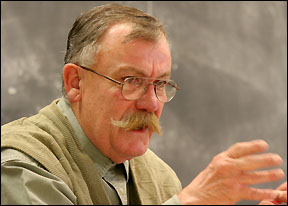Veteran gives insight on Vietnam story
Bill Ryan - who broke his back in Vietnam in March 1967 and who taught agriculture at PAHS for 26 years, retiring in 2004 - spoke to the ninth grade English classes about the Vietnam story "Where Have You Gone, Charming Billy?" on Tuesday, Nov. 8. By coincidence, it was the same week as Veteran's Day, giving double meaning to Ryan's discussion with the students.
Last year, their new English books included this Vietnam story by Minnesota author Tim O'Brien, said English teacher Michelle Andersen. But they didn't read it until spring, when Ryan came to class and discussed the story and his experience.
 Andersen said she was a little apprehensive because she knew it's such an emotional subject, especially for students with relatives currently in the military. But his talk was a success, and, at the end of the year, in giving feedback her students said it was the most memorable of the year.
Andersen said she was a little apprehensive because she knew it's such an emotional subject, especially for students with relatives currently in the military. But his talk was a success, and, at the end of the year, in giving feedback her students said it was the most memorable of the year.
Vietnam veteran Bill Ryan, a former teacher, spoke with four English classes before Veteran's Day, sharing his war experiences and shedding insight into a short story the students read in class.
Ryan explained the Vietnam War in broad history - that the United States was trying to stop the spread of Communism from North Vietnam to South Vietnam - to small details - such as Vietnamese kids begging for food with their eyes.
He talked about details of the story - how soldiers take their minds off the immediate danger of their situation by doing things like counting $1 for each step; why helicopter landings were necessary (no roads) and dangerous (letting the enemy know their exact location); how it felt to get mail from home; and why the water in rice paddies is so filthy and slippery.
He also told his own story. His mechanized infantry company was leaving a perimeter they had set up in the jungle and moving towards Cambodia. They left an hour behind most of the other units, and the enemy placed landmines on the road during the interval. Ryan, a radio-telephone operator, was sitting on the back of an armored personnel carrier when it hit a mine, launching him 60 feet into the air.
Ryan explained how he thought he was paralyzed and therefore considered himself very fortunate to have just bruised, not severed, his spinal cord, though he did break some vertebrate in his back.
He read a poem that he wrote for his three children explaining his anguish and desperation for help that day in Vietnam in March 1967. "I laid on the ground paralyzed, not knowing what would happen next," he explained.
Despite spending a year in the hospital, having to learn to walk again, and enduring three back surgeries, Ryan told the students: "I'm one of the most fortunate men on this planet." He has a great wife, a great family, a nice farm, a comfortable income, etc. "What do I have to complain about? Absolutely nothing," he said.
Ryan also answered questions from the students. After Ryan said that "You don't go to a war and come back the same," a student asked how had he changed. Ryan answered that he had changed in many ways. Such as, he has a much deeper appreciation for human life. "Life is so precious," he said. "And we take it for granted." In Vietnam, he explained, they would eat breakfast together, not knowing if the guys you were eating with, or yourself, would be there for supper.
He also said that he saw and came to understand real poverty. Vietnamese villagers would wait, he told the students, at the army dump to pick through their garbage for something to eat.
He also learned not to judge people by skin color. The Vietnamese were kind, honorable, and quiet, he said, and he harbors them no ill will. "They just wanted to live like we doŠin freedom," he explained.
"Prejudice is wrong," said Ryan, a new member of the Paynesville Human Rights Commission. He added that he likes to speak about his war experiences, especially to students, so they can understand what veterans went through.
Ryan told the students what it felt like to be spit in the face by a anti-war protester after having his back broken in Vietnam, he explained the importance of camaraderie, and he showed them his Purple Heart.
"I have never experienced anything as profound as the three and a half months I spent in Vietnam," said Ryan.
Contact the author at editor@paynesvillepress.com • Return to News Menu
Home | Marketplace | Community